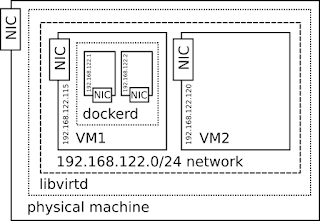Update 2017-12-25: possibly better way: Definitive solution to libvirt guest naming
This is basically just a copy&paste of commands from this great post: [Howto] Automated DNS resolution for KVM/libvirt guests with a local domain and Automatic DNS updates from libvirt guests which already saved me a lots of typing. So with my favorite domain:
Make libvirtd's dnsmasq to act as authoritative nameserver for example.com domain:
# virsh net-dumpxml default <network> <name>default</name> <uuid>2ed15952-d1c0-4819-bde5-c8f7278ce3ac</uuid> <forward mode='nat'> <nat> <port start='1024' end='65535'/> </nat> </forward> <bridge name='virbr0' stp='on' delay='0'/> <mac address='52:54:00:a4:40:a7'/> <domain name='example.com' localOnly='yes'/> <ip address='192.168.122.1' netmask='255.255.255.0'> <dhcp> <range start='192.168.122.2' end='192.168.122.254'/> </dhcp> </ip> </network>
And restart that network:
# virsh net-edit default # do the edits here # virsh net-destroy default # virsh net-start default
Now configure NetworkManager to start its own dnsmasq which acts like your local caching nameserver and forwards all requests for example.com domain to 192.168.122.1 nameserver (which is libvirtd's dnsmasq):
# cat /etc/NetworkManager/conf.d/localdns.conf [main] dns=dnsmasq # cat /etc/NetworkManager/dnsmasq.d/libvirt_dnsmasq.conf server=/example.com/192.168.122.1
And restart NetworkManager:
# systemctl restart NetworkManager
Now if I have guest with hostname set (check HOSTNAME=... in /etc/sysconfig/network on RHEL6 and below or hostnamectl set-hostname ... on RHEL7) to "satellite.example.com", I can ping it from both virtualization host and another guests on that host by hostname. If you have some old OS release on the guest (like RHEL 6.5 from what I have tried, 6.8 do not need this), set hostname with DHCP_HOSTNAME=... in /etc/sysconfig/network-scripts/ifcfg-eth0 (on the guest) to make this to work.
